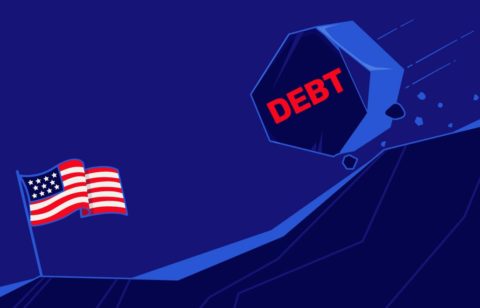Americans are more in debt now than they have ever been. The numbers on household debt show that it has reached a high that has surpassed the staggering number reported during the financial crisis in 2008, when the nation began to sink into the Great Recession. As of the end of March 2017, household debt in America reached $12.73 trillion, which is $50 billion higher than it was in 2008. This is according to the Center for Microeconomic Data, a part of the New York Federal Reserve that tracks statistics and trends relative to household debt in America.
Now, with the U.S. economy on the rebound and people feeling quite optimistic about their financial futures, American consumers are eagerly borrowing money. With interest rates so low and banks finally easing their credit practices, Americans have tremendous borrowing power, and this trend shows no signs of easing up.
Consumers choosing to purchase homes, cars and other big-ticket items: these are all good for the U.S. economy. However, even though delinquency rates are much lower than they were in 2008, it is still a bit worrisome some that Americans are accumulating so much debt.
Why are Americans accumulating so much debt?
The pursuit of the American dream is a long held ideal that is near and dear to the hearts of most Americans. Some of the debt they acquire is “good debt.” For example, obtaining an affordable mortgage in order to make an investment in a home is good debt. Or, taking out a student loan to acquire an education that will raise your earning power over your lifetime is, most likely, a good investment.
However, there are many other reasons why Americans are accumulating debt at an alarming pace, aside from the bedrock purchases of homes and education. Many consumers simply have no knowledge or experience in managing money or have limited skills on budget building and saving money. Those that have not learned to stretch their dollars to make ends meet will often rely on credit cards to make up for the budget shortfalls they encounter on a monthly basis. In addition, many consumers lack the financial discipline necessary to live within their means.
Another problem is that most Americans have no money in savings. Estimates by many financial experts state that nearly 70% of consumers in the United States have less than $1,000 dollars saved for unexpected purchases or emergency expenses. When these expenses occur, such as car repairs or medical bills; often, consumers must use a credit card to cover the expense. This can lead to lots of high interest debt that can snowball over a short period.
In other instances, consumers will accumulate debt due to an event such as an unexpected medical emergency. This can be particularly problematic if it interferes with a consumer’s ability to work and earn income. If a consumer loses a job, it can be catastrophic, often leading to the accumulation of a considerable amount of debt. In many cases, credit cards are these consumer’s only way to survive.
Sometimes, consumers do not realize the financial trouble they are in until they are on the brink of insolvency. It is only when they realize that they are in danger of not being able to meet their financial obligations that the depth of their money problems becomes known. If this happens, it’s important that they act quickly to mitigate their debt problem.
If you are seeking a solution to an overwhelming debt problem, you may be considering working with a credit-counseling agency. While the design of their plans is to reign in consumers’ debt problems and get them back on track to financial health, there are some downfalls and hazards that consumers should consider. Here are some important things you should be aware of before you decide to hire a debt management agency.
1. There is not much difference between the plans
Most plans offered by debt management agencies are the same, in essence. While the names and marketing change, the plans feature a similar structure. Most agency fees are approximately 2.5% of a consumer’s total debt. Sometimes, if there are extenuating circumstances, such as an extreme hardship, a consumer may be able to negotiate a lower fee.
In addition, banks and other future potential lenders do not usually distinguish between the agencies in the marketplace. Most agencies set up a similar payment plan that involves paying off your debt within a period of 3-5 years.
Most agencies will allow you to exit the program at any time if you so choose. Many also allow you to pay more toward your debt, if possible, to pay it off faster.
2. You are essentially hiring someone to make payments for you
Part of the stress of being in oppressive debt is the administrative burden of managing multiple payments to your creditors. A debt management agency offers a plan that makes payments for you until all your debts are gone.
These companies don’t issue loans to clients, and they don’t negotiate with creditors to reduce the balance owed on the account. They generally just negotiate a payment plan, sometimes at a lower interest rate and with reduced fees. This scenario is helpful because a larger percentage of your payment would go toward the principal of your loan. Some creditors, however, don’t offer any concessions.
3. It can be hard to find the right partner
It’s important that you choose a company with a good reputation for genuinely helping consumers resolve their debt problems. Unfortunately, many companies in the marketplace do not have the best interests of the consumer in mind. Non-profit credit counseling organizations that belong to the National Foundation for Credit Counseling (NFCC) or the Financial Counseling Association of America (FCAA) are what consumers should be looking for in an agency. These organizations ensure that their members face a rigorous set of standards and have counselors that have met the requirements of a comprehensive program of certification. Even if they have endorsement, though, or they are members of these reputable organizations, be careful to choose an agency with a track record of sending payments to creditors in a timely fashion. Strong customer support is an important attribute to look for.
4. Avail of credit counseling first
It’s important that consumers meet with a counselor first to have a thorough assessment of their financial situation performed. Your ability to manage your basic expenses is an important aspect of getting control of your finances and working toward a manageable financial situation. A credit counselor will be able to assess your financial picture and bring ideas to the table on how your might get be able to solve your debt problem. Counselors typically have training to ask the right questions and offer up compassionate and well-thought-out solutions to your debt problem.
5. Debt management is not for everyone
Determining whether a debt management plan is the right solution for you is a very important part of the process. Assessing the type of debt you have is imperative to understanding if debt management can truly help you solve your debt problem. If your debt consists of primarily unsecured debt such as credit cards, medical bills and personal loans, debt management may be a good solution for you.
However, if your debt consists of complex debt, such as child support or unpaid taxes, there is a very good chance that debt management isn’t an ideal solution for you. It’s also important that you are able meet the long-term obligations that your credit counselor has negotiated for you.
6. Once negotiated, your plan is simple
Your counselor will do his or her best to negotiate the best possible repayment plan for you. Your payment plan should be stable, meaning your payments should remain the same every month. This will help you plan your finances for the next few years. Payment plans generally stay the same until your debts are gone.
Depending on the structure of your accounts, and their balances, some debts will go away faster than others will. Once a balance is satisfied, the payment for that debt is redirected to help pay off other debts. In addition, calls from creditors will stop once a repayment plan is in place, taking away unnecessary and unwanted stress and aggravation.
7. Closing your accounts is a necessary action
When you enter into a repayment agreement with a debt management company, it will likely ask you to close all your accounts and not acquire any new ones until you have paid off all your debt. The intent is to make you change your spending habits and prohibit you from acquiring more debt while you’re working to pay off your existing debt. This is a good practice but one that many consumers are afraid of. They have become so accustomed to depending on their credit cards that they feel vulnerable without them. Generally, the consumer can keep one card to use in the event of an emergency, but that card should have a low interest rate.
8. You will have to report your account details every month
When a debt management company takes charge of managing your debt, it will still need some help from you to keep track of what you owe. While the agencies will keep track of your principal balance, its reports will not show the interest you must pay on your credit card balances every month. Therefore, it is important that you help your partner reconcile your balance each month so there is a clear picture of what you still owe. You can simply send in your statements to the agency every month to do this.
9. Debt management can affect how lenders perceive you
Even though you are paying your bills each month with a debt management plan, chances are strong that you are paying less than the required amount. Potential lenders will be able to recognize that you are paying through a third party, and that lets them know that you are struggling to stay afloat. Most lenders will require that a debt management plan be finished and all the debt paid off before issuing a new loan to the consumer.
While debt management is not a bankruptcy, lenders will sometimes view it similarly. However, since bankruptcy is such a serious financial decision that will have long-lasting effects on your credit, debt management is a better choice. Once you have paid off your debt, your credit score should rebound over time.
Using a debt management agency to help you consolidate your debts can be a positive step for many consumers struggling with credit card debt. Sometimes, if consumers act swiftly once they realize insolvency is ahead, they can help themselves by stopping all credit card use and requesting that their lenders reduce their interest rates. With self-discipline and good budgeting, some consumers can work their way out of debt on their own. There are some good tools available to consumers online to help them formulate a budget or calculate their debt repayment options.
If consumers wait too long to address their debt problem, many times, their options become very limited, with debt management no longer an ideal choice. Rather than claim bankruptcy, which is a catastrophic event, consumers might consider getting some debt relief through a debt settlement company. National Debt Relief helps consumers become debt free by negotiating with their creditors to reduce their balances and get them paid off once and for all. Although debt settlement isn’t a fast process, and it will still have a negative effect on your credit score, it is a good alternative to bankruptcy.
Getting on top of a debt problem is sometimes a difficult path, but so is living day to day with the stress of being in over your head. Take action before your options become too limited.





